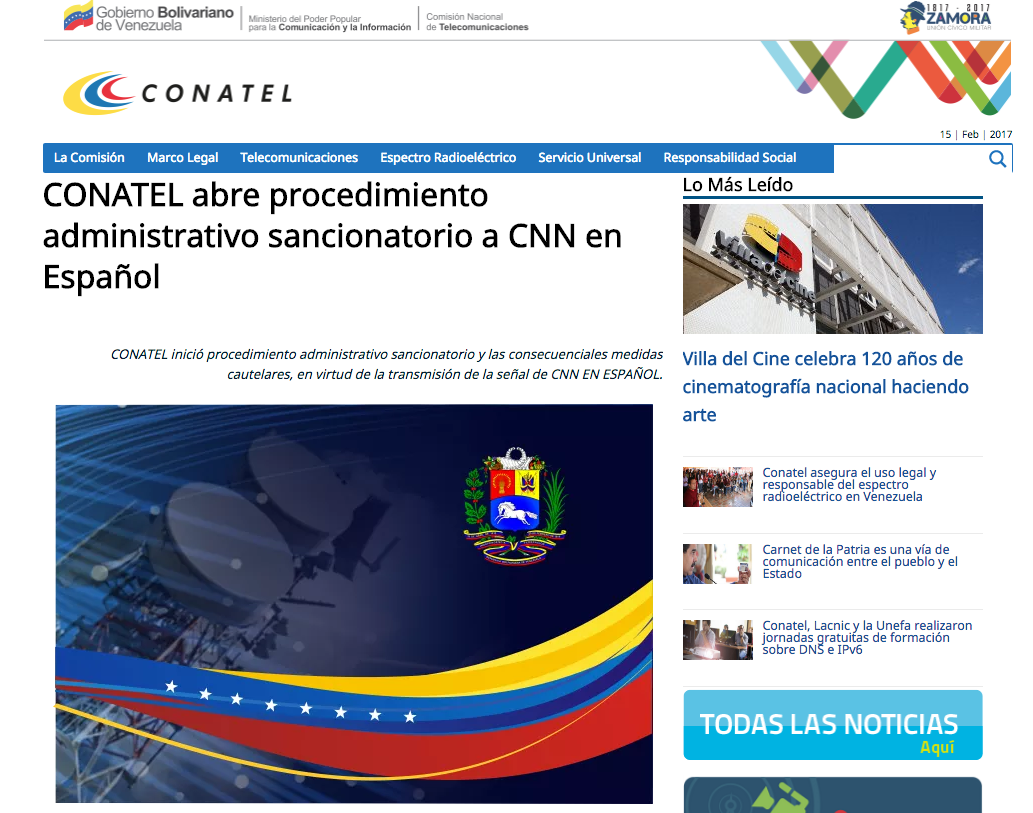CARACAS – President Nicolas Maduro’s government ordered the suspension of CNN’s Spanish-language service from Venezuela’s airwaves on Wednesday, accusing it of distorting the truth in coverage.
U.S.-based ‘CNN en Español’ became unavailable on some cable providers minutes after a statement by telecommunications regulator Conatel announcing the suspension.
The network had irked the socialist government with various reports, including one alleging that Venezuelan passports and visas were being sold illegally at the embassy in Iraq.
Maduro at the weekend had told CNN to “get out” of Venezuela after accusing it of manipulating comments by a student who had told him on live TV of problems at a school, including students fainting from hunger.
“They defame and distort the truth …inciting aggression against the sovereignty of Venezuela and its institutions,” regulator Conatel said in its statement.

“Conatel ordered as a precautionary measure the suspension … of all CNN en Español transmissions in the national territory.”
Foreign minister Delcy Rodriguez also lambasted CNN on Wednesday, saying the whistleblower in the passports’ story was an opposition-linked Venezuelan working for “imperialist” intelligence agencies.
“Today the government of Venezuela pulled our television signal, denying Venezuelans news and information from our television network, which they have relied upon for 20 years,” said a CNN statement, adding that its signal would be available for free on YouTube.
The spat with the network has come at a delicate time in U.S.-Venezuelan ties after Washington this week blacklisted Maduro’s Vice President Tareck El Aissami on drug charges in the first bilateral flare-up under new U.S. President Donald Trump.
Venezuelan officials have reacted furiously to that, though they appear to be trying to avoid provoking Trump.
“I don’t want problems with Trump,” Maduro said on TV on Wednesday, adding that CNN had become “an instrument of war.”
Pdte. @NicolasMaduro enfatiza a Trump que CNN y el Departamento de Estado le están imponiendo una política equivocada hacia Venezuela pic.twitter.com/OeKWivg1S2
— BarrioTricolor (@Barrio_Tricolor) February 15, 2017
In various calls with Latin American leaders, Trump has been expressing concern over the Maduro government, though it remains unclear how much of a foreign policy priority Venezuela is.
OPEC member Venezuela is immersed in a deep economic crisis, with inflation in triple digits, shortages of basic goods, and many people going hungry.
Maduro, whose popularity has plunged during the crisis, blames the problems on an “economic war” waged by the United States and local opponents with the complicity of foreign media.
Opponents say he has become a dictator, jailing opponents, sidelining the opposition-led congress and delaying local elections. Government officials say opponents are seeking a coup.
Foreign journalists are finding it increasingly hard to obtain visas to operate in Venezuela, and two Brazilian reporters said they were expelled at the weekend while trying to investigate unfinished works by construction giant Odebrecht.
GIRISH GUPTA










